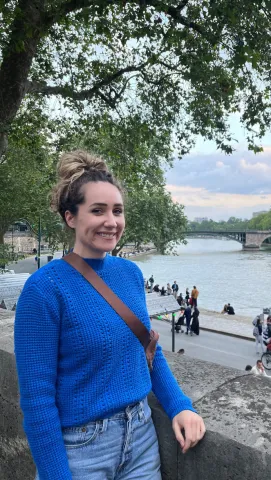
Helping Kids Hear and Thrive: Alison's Impact as a Pediatric Cochlear Implant Audiologist

Since the 1980s, cochlear implants have helped over 600 children across BC and Yukon to hear. These small electronic devices assist people with severe to profound hearing loss—giving them the ability to hear their own voice, listen to sounds around them, and better communicate with friends and family members.
BC Children’s Hospital (BCCH) hosts the only pediatric cochlear implant team in the region, with a multi-disciplinary team of surgeons, audiologists, social worker, and psychologist. Ali Jones, an audiologist, has been a member of BCCH’s cochlear implant team since 2019. With a background in linguistics, she originally was interested in speech-language pathology before a graduate studies application-required an observation with an audiologist. This shifted her path entirely.
“Audiology is this wonderful combination of science and communication,” she reflects. Ali’s daily work, though centered around technology, is truly about human connections. She follows each patient closely, beginning with cochlear implant candidacy evaluations, and activations, and continues with ongoing support that involves programming the devices and monitoring the child's progress. Her focus is on ensuring each child can meet language milestones and develop communication skills essential for their growth.
“The most rewarding part is the relationship building with the families,” Ali says. “Over the first year, we see them at least six times in clinic and then at least once or twice a year after that.” Alison finds deep satisfaction in witnessing her young patients experience the transformative effect of hearing on their lives, enabling them to connect with the world around them in new ways.
“I once worked with a child who had progressive hearing loss; when they were born, they had mild hearing loss that progressed to such a level that it was really difficult for her to understand spoken language,” Ali recounts. “During her activation [of the cochlear implant] she said everything sounded extremely weird! But then shortly afterward, she blossomed and took off with it, communicating with ease and it just improved everything in her life.”
While the work is greatly rewarding, it is not without its challenges. Like many health science professionals in BC, audiologists make the most out of limited resources, heavy caseloads, and significant staffing shortages that places the bulk of the burden of care on them.
“Over the past three years we’ve had a vacant clinical coordinator position in our team,” Ali said. “And because we don’t have a clinical coordinator, our team has shared that role, and I think we’ve each experienced burnout at different times. We’re trying our best to carry on but it’s hard.”
To address ongoing staffing shortages and alleviate Ali’s heavy caseload, HSA is actively pushing for government to fund additional positions at fair wages so that BC Children’s Hospital is equipped to handle the unique needs of children who depend on Ali and her colleagues’ expertise.
Her team has also been impacted by the move to the new classification system: previously classified as grade II, Ali—along with most audiologists—were matched with the P1 Working Professionals profile despite their specialized competencies. Her college recognizes that she works in a niche field and her job description as an Audiologist requires certain specialized certifications, but it’s not reflected in her classification.
“HSA has long advocated for a classifications system that adequately keeps pace with the changes in healthcare, which resulted in a new, profile-based classification system,” Derek Wong, Membership Services Coordinator at HSABC, shares. “With the system implemented this month, we immediately gave notice and started the process of determining which specialized procedures and techniques would be added to the P2A profile. Audiologists, like most of the health science professions, had never before had the opportunity to have this type of work recognized at this classification and pay level.”
Under BC’s Health Science Professionals Bargaining Association (HSPBA) collective agreement, advanced competencies like Ali’s can finally be recognized for the first time. As one of only a few audiologists in the province trained in cochlear implant services, Alison’s work appears likely to qualify for the P2A Special Procedures profile that would more appropriately match her unique skills.
“At the end of the day, we’ve substantially increased the number of candidates for cochlear implantations over the past 20 years, and we haven’t received adequate funding to support our growing program,” Ali says. “Having better wages and being fully staffed in our clinic would help to compensate us for the hard work that we’re doing.”
Despite the current challenges affecting delivery of care across the whole health care system, Ali remains optimistic about the future. The rewards of seeing a child hear their parent’s voice or watching them meet their language goals outweighs the obstacles. “It’s amazing to see when sound becomes meaningful and when a child is starting to produce language,” Alison shares. She remains dedicated to her patients and is hopeful that the next round of bargaining will bring much-needed support to her team and, most importantly, to the children who depend on them.